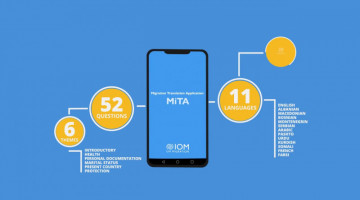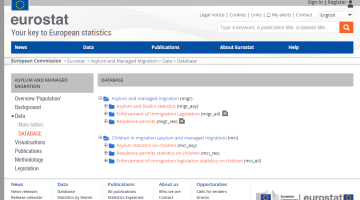Library
- Material - Platform / Website
This pack presents examples of innovative practice in gender and migration. It is a concise and practical resource consisting of: Overview Report, outlining the main issues and offering recommendations for ways forward; Supporting Resources Collection, with summaries of key texts, case studies and...
SourceInstitute of Development Studies (IDS)
- Material - Platform / Website
IDWF is a global organization of domestic and household workers whose objective is to protect and advance domestic workers’ rights worldwide. It began as the International Domestic Workers Network (IDWN) with the goal of championing an ILO Convention to protect the rights of domestic workers...
SourceInternational Domestic Workers Federation (IDWF)
- Material - Platform / Website
RET International is a humanitarian organization that works to provide protection and education for vulnerable migrant groups, particularly young women. It has a toolbox of 10 main areas of intervention and works in Asia, Africa, and Latin America.
SourceRET International
- Material - Platform / Website
WIMN brings together organizations, activists, and migrants to organize collectively in order to expand rights-centered policies that address the needs and interests of diverse groups of women. Campaign priorities include gender-responsive workers’ rights, access to health services (including sexual...
SourceWomen in Migration Network (WIMN)
- Material - Platform / Website
This page from the Migration Data Portal provides an overview of key definitions, existing datasets, and analysis on the topic of gender and migration.
SourceInternational Organization for Migration (IOM) IOM’s Global Migration Data Analysis Centre (GMDAC)
- Material - Platform / Website
UN Women’s Data Hub has developed Women Count, a data visualization initiative that allows for monitoring the implementation of the SDGs towards achieving gender equality. It provides country fact sheets and a dashboard that can be navigated by theme, including data on trafficking.
SourceUN Women
- Video -
Since the arrival of COVID-19, MiTA — IOM’s new Migration Translation App—has been given a rapid upgrade to take account of the added challenges facing migrants in the Western Balkans. A new section is designed to help border management officials identify persons at risk and refer them for medical...
SourceInternational Organization for Migration (IOM)
- Proyectos -
This regional programme seeks to protect and empower communities adversely affected by climate change and disasters in the Pacific region, focusing specifically on climate change and disaster-related migration, displacement, and planned relocation. The programme is delivered through a partnership...
SourceInternational Labour Organization (ILO), International Organization for Migration (IOM), Office of the United Nations High Commissioner for Human Rights (OHCHR), United Nations Economic and Social Commission for Asia and the Pacific (ESCAP)
- Material - Report
This document brings together the ILO general principles and operational guidelines for fair recruitment (“principles and guidelines”) and the definition of recruitment fees and related costs. The principles and guidelines were developed by a Tripartite Meeting of Experts, held in September 2016.
SourceInternational Labour Organization (ILO)
- Material - Report
This report constitutes a source of information on the current state of labour migration governance challenges, bilateral agreements on labour migration, regional labour migration and mobility and fair recruitment.
SourceInternational Labour Organization (ILO)
- Material - Platform / Website
This website offers information on ILO projects addressing the climate change-labour migration nexus as well as briefings and other resources.
SourceInternational Labour Organization (ILO)
- Material - Platform / Website
The website provides an interactive platform of data on internal displacement, designed for policymakers, among others. It provides data on situations of displacement associated with sudden-onset natural hazard-related disasters for the years 2008 to 2019.
SourceInternal Displacement Monitoring Centre (IDMC)
- Material - Platform / Website
The Platform on Disaster Displacement is a State-led initiative focused on the implementation of the Nansen Initiative’s Protection Agenda, working towards better protection for people displaced across borders in the context of disasters and climate change. The platform provides a collection of...
SourcePlatform on Disaster Displacement
- Material - Platform / Website
This webpage introduces the topic of environmental migration and gives an overview of existing data sources, including their strengths and limitations.
SourceInternational Organization for Migration (IOM) IOM’s Global Migration Data Analysis Centre (GMDAC)
- Material - Platform / Website
The portal offers information on IOM’s work in the area of migration and climate change and provides research, data and information on the migration, environment and climate change nexus and related global policy processes, such as the GCM.
SourceInternational Organization for Migration (IOM)
- Material - Platform / Website
Eurostat, the Statistical Office of the European Union compiles data on asylum and managed migration primarily based on administrative sources provided by EU Member States’ national statistical offices, interior ministries or related immigration agencies, as well as by Iceland, Norway, Liechtenstein...
SourceEurostat
- Material - Platform / Website
This page from the Migration Data Portal gives an overview of key concepts in diasporas and introduces main datasets that have been developed on this topic.
SourceInternational Organization for Migration (IOM) IOM’s Global Migration Data Analysis Centre (GMDAC)Objetivos del PMM
- Material - Platform / Website
This website offers a compendium of methodological guides on anticipation and matching of skills supply and demand, consisting of a total of six publications. This resource list discusses skills needs anticipation more generally (not specific to labour migration) and was published in 2016. Yet, the...
SourceInternational Labour Organization (ILO)
- Material - Platform / Website
This map displays a global database of national laws, policies and regulations (policies) that have defined recruitment fees and related costs. It can be used for an overview of national laws and policies.
SourceInternational Labour Organization (ILO)
Pagination
About the Migration Network Hub
What is the Migration Network Hub?
The Hub is a virtual “meeting space” where governments, stakeholders and experts can access and share migration-related information and services. It provides curated content, analysis and information on a variety of topics.
The Hub aims to support UN Member States in the implementation, follow-up and review of the Global Compact for Migration by serving as a repository of existing evidence, practices and initiatives, and facilitating access to knowledge sharing via online discussions, an expert database and demand-driven, tailor-made solutions (launching in 2021).
Submit your content
What content is displayed in the Hub?
The Hub aims to help you find information on migration, ranging from policy briefs and journal articles, existing portals and platforms and what they offer, to infographics and videos. The different types of resources submitted by users undergo peer review by a panel of experts from within the UN and beyond, before being approved for inclusion in the Hub. To provide guidance to users based on findings of the needs assessment, the content is ordered so that more comprehensive and global resources are shown before more specific and regional ones. Know a great resource? Please submit using the links above and your suggestion will be reviewed. Please see the draft criteria for existing practices here.
Apply to join the Peer Review Roster
Content submitted to the Migration Network Hub is first peer reviewed by experts in the field from both the UN and beyond. Applications are welcomed to join the roster on an ongoing basis. Learn more here.
Contact us
We welcome your feedback and suggestions, please contact us
*Todas las referencias a Kosovo deben entenderse en el contexto de la Resolución 1244 [1999] del Consejo de Seguridad de las Naciones Unidas.
Newsletter
Subscribe to our newsletter.
